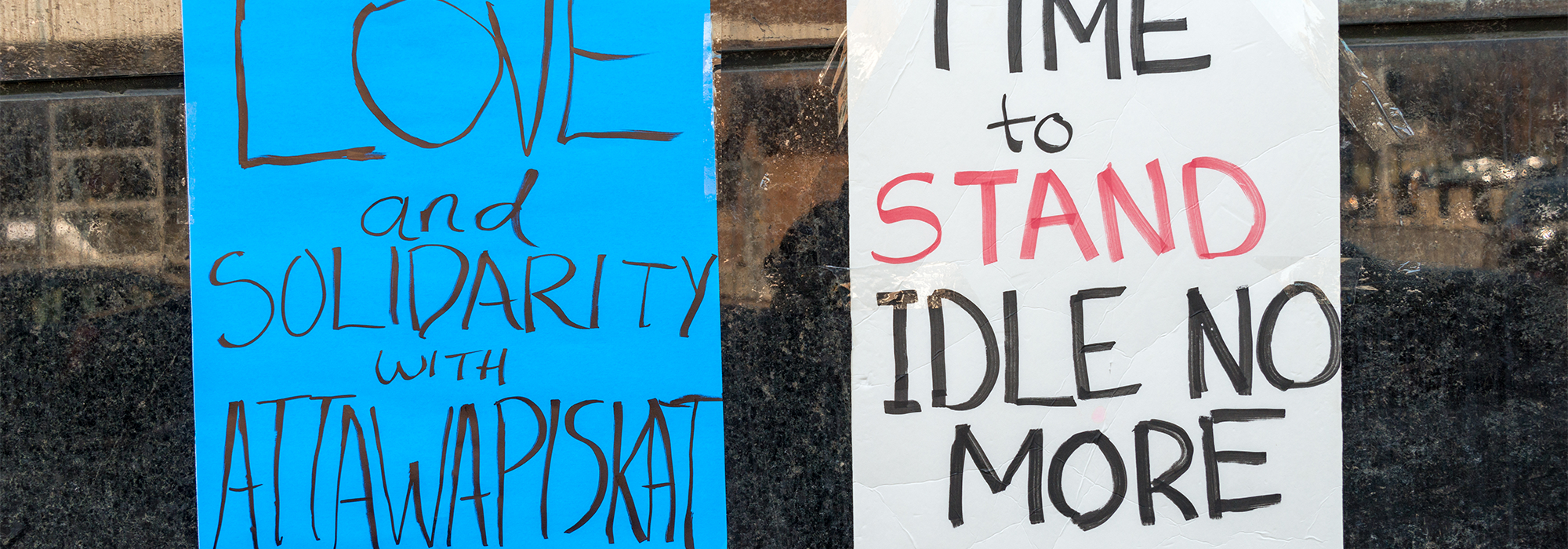
When I read what former prime minister Jean Chrétien had said about the crisis in Attawapiskat, and the notion that residents should consider moving away, I was floored. Others have also made this case recently in the media. I have been shocked by the ignorance, and so I am compelled to write a response as an unwaged Indigenous advocate. It comes down to well-paid politicians and parliamentarians tied to an economic paradigm that lacks a moral code and ultimately serves no one.
All people are born into cultural worldviews, and as we age our parents, families, and communities walk us deeper and deeper into these paradigms with beliefs, stories, rituals, songs, and dances. While some paradigms are sustainable, other paradigms are completely destructive. This is particularly true of the current economic paradigm that the industrial era and capitalism have ushered in.
The beliefs and assumptions that the current economic paradigm rests on are progress at all costs, while the land, women, the elderly, and children are secondary. While it is pretty clear that this economic paradigm is not working for Indigenous people, it is also not working for all Canadians. Let’s face it, if Indigenous people lack clean water, air, and land, so do all Canadians. Sadly, it seems that Indigenous people are the canaries in the coal mine of our sick societal structures and blind decision makers.
We all know our water is in jeopardy by this current model of the world. Why is it then that prime ministers (past and present) and parliamentarians are unable to perceive these problems? The issues are not about geographic isolation, nor a lack of economic activities, nor uneducated Indigenous people, nor is it about Indigenous people feeling nostalgic about the land. It’s about human dignity.
At a basic level, the issues that Indigenous people are struggling with are about living with a lack of human dignity, more specifically about the long-term denial of human dignity as manifested through colonial policy and laws that had denied Indigenous people their fundamental rights: Good clean warm housing for each family, a proper sewage elimination and treatment system, and a clean water supply. These are basic human rights that all people are entitled to regardless of the cost to the nation state.
Meaning is the myelin sheath of the human spirit. At another level, the issues are about the human right to construct institutions and governance structures such as an education system and medical system that are meaningful to the people. People have a right to feel good about who they are and a right to experience themselves within meaningful societal structures. Canada continues to deny Indigenous people their basic human rights through imposing on them what Canada the nation state thinks is best for the people.
If you want to help people, the first thing you need to do is listen to them. Listening, though, is not enough in that you must also put the knowledge gained into concrete action. Again, it is a mistake for Canada to think that they know what is best for Indigenous people. This is especially so if the people making the decisions are trapped in the wrong paradigm. While many things can be addressed in the short term with money, such as housing, water, and sewage issues, a complete paradigm shift is required.
Indigenous people need to be active agents in their lives, they must be the people who are making the decisions for their families and they need the resources to make these decisions. The best and only way that Canada can do this is through honouring the nation-to-nation relationship that is rooted in the equal sharing of the land and resources.
Indigenous people need our equal share of our land and resources, the very land and resources needed to live a good life. We need these resources to realize our basic human rights such as good clean water and sewage systems, and we also need resources so we can build meaningful structures that speak to us such as an education system that is built on our knowledge philosophy and paradigm, and a medical system that is built on our understanding of the human condition – one that values the nature and importance of the human spirit.
Raphael Lemkin defined genocide in 1944 in cultural terms. His definition of genocide has two phases: one, the destruction of the national pattern of the oppressed group; the other, the imposition of the national pattern of the oppressor. The thing about cultural genocide is that it shape-shifts into suicide.
Indigenous people have a right to rebuild their nations, communities, and societies as they dream them to be. Indigenous people have the right to move out from under Canada’s paradigm and the genocidal policies and laws that continue to harm us. Otherwise, suicide will continue.
Many Canadians cannot grasp there is a much more valid and sophisticated paradigm than the current destructive economic model of the world. Jean Chrétien suggests that education is key. He is right – but it is prime ministers, parliamentarians, law and policymakers that need urgently to be educated. Specifically, Canada needs to be taught to see the limitations of their destructive worldview. This is a vision disability that can be resolved, that is if the people are willing to listen, think, and learn.
Photo: rmnoa357 / Shutterstock.com
Do you have something to say about the article you just read? Be part of the Policy Options discussion, and send in your own submission. Here is a link on how to do it. | Souhaitez-vous réagir à cet article ? Joignez-vous aux débats d’Options politiques et soumettez-nous votre texte en suivant ces directives.







